The importance of art cannot be overstated. Art plays a vital role in the development of individuals, societies and countries alike. It has been found to have an impact on physical, mental and social well-being. By engaging with art, people can express their creativity and explore new ideas that may not be possible through other means.
From its ability to instil feelings of pride and belonging to its capacity to inspire inspiring works of art, it is clear that art makes an invaluable contribution to both individuals and societies.
In this article, we explore 15 of the importance of art on individual, societal and country levels.
15 Benefits of Art
Art is an important part of society and can have a significant impact on individuals, societies and countries in the following areas:
1. Art Enhances Cultural Awareness
Art can help people to appreciate different cultures as it often provides insight into different lifestyles, values and beliefs. By engaging with works of art created by individuals from diverse backgrounds, we are able to gain a better understanding of those different cultures.
For instance, the art of a particular community can reveal a lot about its history, stories and traditions. By studying these works of art, we can gain valuable knowledge that helps to strengthen our cross-cultural understanding.
5 Ways Art Enhances Cultural Awareness
- Art can help to bridge the gap between cultures.
- Works of art often provide insight into different lifestyles and values.
- Engaging with art can help individuals to understand and appreciate diversity.
- People can learn about different cultures through art.
- Art can help to foster positive intercultural dialogue and understanding.
2. It Develops Creativity and Imagination
By engaging with art, individuals are encouraged to think outside the box and explore new ideas. They are also able to express their own creativity through various mediums such as painting, sculpting or drawing. This can help them become more creative in other aspects of their life too.
If a person is able to think in a creative and imaginative way, this can help them to solve problems, develop new strategies and come up with innovative solutions.
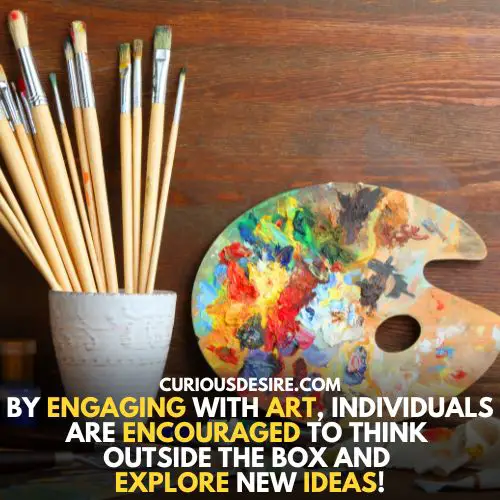
3 Ways Art Develops Creativity and Imagination:
- Art encourages individuals to express themselves creatively.
- It helps people to become more open-minded and explore different possibilities.
- Engaging with art can help individuals to become better problem-solvers.
3. Art Promotes Critical Thinking
Art encourages people to think critically and analyze works of art with a more open mind. This can help individuals develop their problem-solving skills as they are able to consider different viewpoints, assess arguments and draw conclusions.
For example, when viewing a painting, people can consider the different elements that make up the artwork and come to their own interpretations. This encourages them to think more deeply about what they are seeing and use critical thinking skills.
According to a study, engaging with art can also help to increase cognitive flexibility, which is an important skill for problem-solving.
4. It Enhances Emotional Development
By expressing themselves through art, individuals are able to better understand and manage their emotions. Art provides a healthy outlet to express feelings that may be difficult or uncomfortable to verbalize, which can help individuals gain an understanding of themselves.
Emotional development is an important part of growing up, and art can be a powerful tool to assist with this process. Through art, people are able to explore their feelings in a safe environment and learn how to express them more effectively.
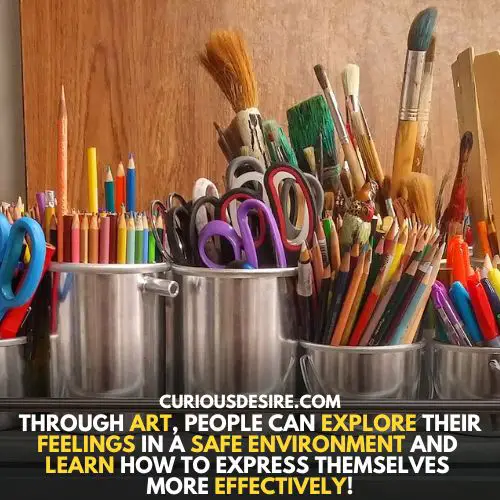
5. Art Boosts Self-Esteem
Engaging with art helps individuals develop a sense of accomplishment and pride in their work, which in turn helps them to feel more confident in their abilities. It can also give individuals a sense of purpose and direction, which can be beneficial in building self-esteem.
Art helps to build self-esteem in the following ways:
- Creative expression
- Self-reflection
- Pride in accomplishments
- a sense of purpose
- Improved problem-solving skills
Suggested Readings:
6. It Improves Mental Well-being
The creative process involved with engaging with art is known to reduce stress and anxiety while increasing feelings of happiness and satisfaction. Art can also be therapeutic as it allows individuals to make sense of their feelings and work through any difficult emotions they may be experiencing.
A study has also found that engaging with art can help to reduce stress levels, as it encourages relaxation and reflection. This helps individuals to better manage their emotions in stressful situations and remain calm.
7. Art Fosters Connections
By engaging in art, people are able to connect with others who share similar interests. This can help to create a strong community and foster understanding between different cultures, which is important for a healthy and harmonious society.
Art can also help to bridge cultural and language barriers, as it is often a universal language that can be enjoyed by people of all backgrounds.
8. It Enhances Conflict Resolution Skills
Art can help to bridge the gap between conflicting opinions, as it encourages individuals to think critically and consider multiple perspectives. This can be beneficial in addressing issues that divide communities, by helping people to find common ground on which they can work together towards a more peaceful resolution.
4 Ways Art Enhances Conflict Resolution Skills
- Art can help to enhance conflict resolution skills through creative expression, self-reflection, and understanding the needs of others.
- Art also allows individuals to express their feelings in a safe environment, so they are better able to manage their emotions during difficult situations.
- Furthermore, art can help to bridge cultural and language barriers, as it can be enjoyed by people of all backgrounds.
- By engaging in art, individuals can better understand those around them and work towards a more peaceful resolution.
9. Art Strengthens Communities
When individuals come together to appreciate and create art, it can help strengthen the connections between them. This is beneficial in cultivating a sense of unity and belonging within communities, which is important for social well-being.
According to research, art can help to foster understanding and appreciation of different cultures. This is especially true when individuals from different backgrounds come together to create or appreciate art.
10. It Encourages Social Interaction
Engaging with art encourages social interaction as it encourages individuals to discuss and share their opinions. This can help to facilitate meaningful conversations and promote understanding between different cultures.
Through art classes and workshops, individuals are able to meet others with similar interests and develop lasting connections. This can be beneficial in helping people to feel more connected and become more engaged in their local community.
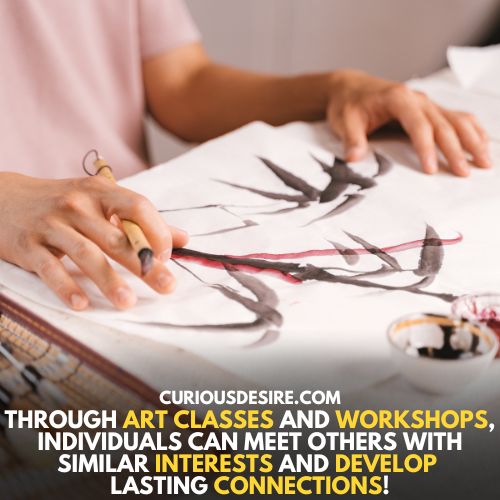
11. It Enhances Problem-solving Skills
By engaging in art, people are able to think outside the box and come up with innovative solutions to problems they may be experiencing. The creative process involved with art can help individuals to think more critically and find solutions that they may not have considered before.
Art is also a great way to practice problem-solving skills, as it encourages individuals to think objectively and evaluate multiple options. This can be helpful in addressing complex issues and finding the best course of action.
12. It Develops Cultural Appreciation
Art helps people to appreciate different cultures as it provides insight into the lifestyles, values and beliefs of different societies. Through engaging with works of art created by people from a variety of backgrounds, we can gain an understanding of how other cultures live and think, which can help to foster tolerance and respect.
Arts develop a cultural appreciation in the following ways;
1. Learning and understanding different cultural values, traditions, and beliefs
2. Experiencing art from different countries or communities
3. Connecting with people of different backgrounds through art classes or workshops
By appreciating art from other cultures, individuals are able to gain an understanding of how different societies think and live. This can be beneficial in increasing empathy and respect, as it encourages individuals to recognize the importance of diversity.
Additionally, engaging in art can help people to better understand global issues and find peace through understanding.
13. It Enhances Cognitive Function
Engaging with art has been shown to improve cognitive functions such as memory, concentration and attention span. Participating in activities such as drawing or sculpting can help people to focus on the task at hand, which can lead to better decision-making skills.
It can also help to develop coordination and motor skills, as individuals must use their hands and eyes simultaneously. By engaging in art, people are able to sharpen their minds and become more alert.
Suggested Readings
14. Art Inspires Creativity
Creative activities like art can help individuals to tap into their creative side and come up with innovative ideas. This can be beneficial in many aspects of life, from coming up with new solutions to problems to creating works of art that express unique thoughts and feelings.
Art inspires creativity in the following ways:
- It allows us to express our ideas and feelings in a creative way.
- It encourages us to think outside the box and be imaginative with our solutions.
- It can help us to break free of existing boundaries and explore new possibilities.
- It provides an outlet for self-expression and exploration of personal identity, beliefs and values.
- It allows us to express our individual styles and create something that is unique to us.
- It can help us to better understand ourselves, our world, and the people around us.
- It can help to develop problem-solving skills as it encourages us to think critically and come up with unique solutions.
15. It Improves Quality of Life
Engaging with art can help to improve the quality of people’s lives, as it can provide an outlet for expression and a sense of purpose and accomplishment. By engaging in activities they enjoy, individuals are more likely to lead happier, healthier and more fulfilling lives.
It can reduce stress and anxiety by providing a distraction from the daily grind and can help to give individuals a sense of purpose and meaning. Additionally, it can help to boost self-confidence, as individuals are able to create something that is unique to them.
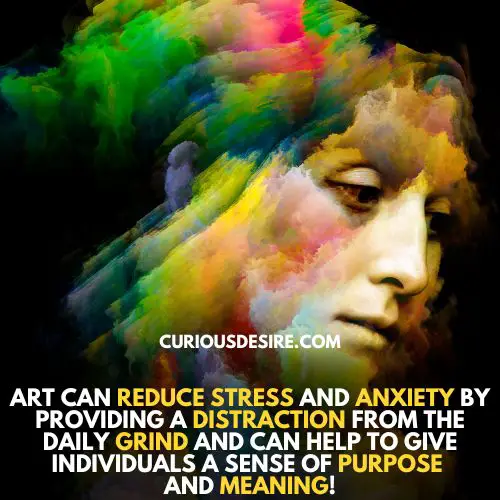
Overall, engaging with art can be beneficial in many different aspects of life. From reducing stress and increasing self-esteem to improving cognitive function, the benefits of engaging with art are numerous.
Importance of Arts on the Individual Level
At the individual level, art has a great impact on personal development. Through creative activities such as drawing, painting or sculpting, people are able to explore their imaginations and express their thoughts and feelings.
By engaging with art, individuals are able to develop an appreciation for different cultures, gain insight into themselves and improve their problem-solving skills. Art can also help to reduce stress, enhance cognitive functions and inspire creativity.
In addition, it can provide a sense of accomplishment and well-being, which can lead to a better quality of life. Overall, engaging with art can be beneficial for the individual in numerous ways.
Importance of Arts on the Group Level
At the group level, art has a powerful impact on social cohesion and well-being. Encouraging people to interact with one another and share thoughts and opinions about works of art, can help to strengthen community ties and foster understanding between different cultures.
Art can also be used to start meaningful conversations and promote empathy and compassion. By engaging with art, individuals are able to develop a greater appreciation for one another, which is essential for strengthening communities.
Benefits of Incorporating Art into Your Child’s Life – 3 Main Benefits
Incorporating art into your child’s life can provide numerous benefits. Some of these are the following:
- By engaging with art, children are able to gain insight into themselves and the world around them. It can also help to improve their problem-solving skills, as it encourages them to think critically and come up with unique solutions.
- Additionally, art can help to reduce stress and anxiety in children, as they are able to express their feelings and emotions through creative activities.
- Furthermore, it can provide a sense of purpose and accomplishment, which can lead to improved self-confidence and better mental health.
Art is an important part of childhood development that should be encouraged in order for children to reach their full potential.
How Making Art Can Help With Stress Relief – Benefits of Art
Making art can be a great way to cope with stress and anxiety. It provides an outlet for emotions and feelings, as well as an opportunity for self-expression.
Engaging in creative activities such as painting or sculpting can help to refocus the mind on something calming and enjoyable. Additionally, it can provide a sense of accomplishment, which can lead to improved self-confidence and better mental health.
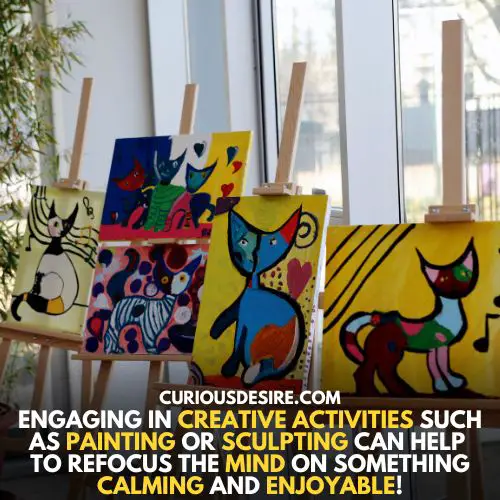
Making art is an effective way to reduce stress and improve overall well-being. By engaging in creative activities, individuals are able to explore their imaginations and constructively express their thoughts and feelings. It can also provide a sense of purpose and joy, which can be beneficial for improving mental health.
Exploring Different Ways to Learn About and Enjoy Art
There are a wide variety of ways to learn about and enjoy art. One great option is to visit local galleries and museums. These institutions often provide educational tours and events, which can help individuals gain insight into different cultures and perspectives.
Another option is to attend art classes or workshops, which can be useful for those looking to develop their creative skills. Additionally, art can be enjoyed through books, films and television shows.
Exploring new ways to experience art is a great way to gain insight into different cultures and perspectives and learn about art’s history and its various mediums. By taking advantage of these opportunities, individuals are able to broaden their understanding and appreciation of art.
Conclusion
In conclusion, engaging with art can provide numerous benefits for individuals and communities alike. From reducing stress and improving cognitive functions to inspiring creativity and promoting social cohesion, the advantages of participating in activities like art are countless.
Therefore, it is essential that we make sure everyone has access to art so they can reap these many benefits. With this in mind, let’s work together to ensure that individuals of all ages have the opportunity to engage with art in a way that works for them.
References
- Martin, L., Oepen, R., Bauer, K., Nottensteiner, A., Mergheim, K., Gruber, H., & Koch, S. C. (2018). Creative Arts Interventions for Stress Management and Prevention—A Systematic Review. Behavioral Sciences, 8(2). https://doi.org/10.3390/bs8020028
- Considering Cultural Appropriation in the Art Classroom – https://theartofeducation.edu/2020/10/23/considering-cultural-appropriation-in-the-art-classroom/
- How Art Therapy Can Relieve Stress – https://sageclinic.org/blog/art-relieve-stress/